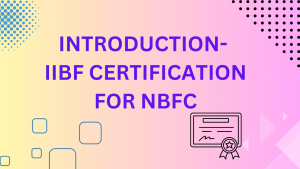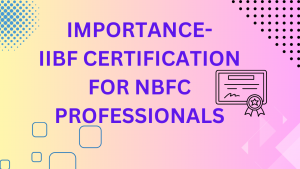Introduction to IIBF Certification for NBFC
Non-banking financial companies are crucial for increasing the banking industry’s competition and diversification while facilitating the availability of financial services to consumers. In India, there are many different kinds of companies that provide financial as well ass investment services to consumers. Because of the industry’s recent reforms, this involves commercial banks, credit unions, and non-banking financing firms. The Indian financial system now includes non-banking financial institutions as a vital component.
Certifications in Non-Banking Financial Companies (NBFCs) can greatly improve the opportunities for employment and show that you have extensive knowledge of the market for financial services. The Indian Institute of Banking and Finance (IIBF) offers one of the well-known credentials in this field. The presence of thorough and trustworthy study material is essential to aiding ambitious individuals in their efforts to obtain this certification. In this post, we’ll look into the IIBF certification programme for NBFCs and talk about the several resources for free study materials that will help you get ready for the certification examination.
NBFC Regulations and Guidelines
Basic requirements for registration as NBFC:
- The organisation must be licenced as an entity under the Companies Act and need have a minimal net owned fund of Rs. 2 Crore in order to be considered qualified as an NBFC.
- The Net Owned Funds are to be determined based on the company’s most recent verified balance statement.
NBFC Regulations issued by RBI:
- Investors of an NBFC may receive interest rates as high as 12.5%. Perhaps monthly intervals can be used to pay or multiply this rate of interest.
- From a minimum duration of 12 months to a maximum duration of 60 months, Non-banking financial companies can renew or accept deposits from the general population.
- No insurance is covered for deposits.
- The RBI does not promise to repay deposits.
- Deposits that are returnable upon request are not accepted.
NBFC Guidelines issued by RBI:
Additionally, the RBI has released ethical standards for several NBFC procedures, namely:
- Management of Liquidity Risk: NBFCs must retain sufficient liquidity to meet its responsibilities. The rules offer an outline for risk management, with stress assessments, keeping liquid assets, along with submitting recurring liquidity statements all included.
- Capital Adequacy: In accordance with the potential risks they face and amount of assets held, NBFCs must keep a certain level of liquidity. The recommendations define the qualifying capital components and provide instructions for calculating capital adequacy ratios. Moreover, NBFCs must adhere to certain rules for recognising revenue, categorising wealth and investment management and establishing allowances for non-performing assets (NPAs).
- Revenues Recognition, Asset Classification and Funding: These regulations guarantee that NBFCs keep up-to-date, fair and transparent financial statements.
- Other Regulatory Authorities: Non-bank financial institutions could potentially be governed by legislation and rules from additional regulatory bodies, including the National Housing Bank (NHB), the Insurance Regulatory and Development Authority (IRDA), the Pension Fund Regulatory and Development Authority (PFRDA), as well as other bodies, based on the specifics of their business operations.
Importance- IIBF Certification for NBFC Professionals
Investigations and analyses have demonstrated that NBFCs surpass banks. The overall level of customer satisfaction along with the client’s feedback among NBFCs has increased by 15% as compared with traditional banking consumers as a result of their ongoing outstanding operations. In accordance with the most recent Financial Stability Report, the RBI concurs with this. The assistance provided by banks and non-banking financial companies (NBFCs), who act as financial intermediates, are very similar.
However, the importance is listed below:
- Innovation and Adaptability: Non-banking financial companies have a reputation with being flexible and capable of evolving with the ever-changing needs of the financial markets and the sub-markets. In order to address changing the requirements of customers, this atmosphere drives experts to innovate. Professionals employed by NBFCs have the chance to help create innovative financial goods, tech-driven solutions, and customer-focused services. This focus on innovation fosters a vibrant workplace that draws experts looking to have a significant effect in the financial sector.
- Quick Processing: While meeting the eligibility requirements is crucial at banks, NBFCs are more forgiving in this area. This simplifies, streamlines, and accelerates the lending approval procedure. People typically ask for loans whenever they have an urgent financial problem. NBFCs have seized this chance to promptly execute the loans at affordable rates of interest in order to meet customer demand. If the balance of the loan is large, the company’s can get it authorised quickly. Moreover, some applicants are even willing to make adjustments and negotiations on the interest rates.
- Loans are accessible for people with bad credit: People with bad credit typically aren’t eligible for loans from banking institutions. This is because if the creditworthiness of a borrower is poor, banks will view them as high-risk persons. It is highly challenging to acquire a loan approved from banks until the credit score is between 600 and 650. On the reverse hand, NBFCs will provide loans to people with bad credit, but the interest rates that they charge these borrowers are typically higher as compared to market rates and the interest rates being offered by the banks and other financial institutions. The majority of NBFCs are expanding as a result of the previously mentioned advantages.
IIBF Study Material for NBFC Certification
Learning Sessions is providing the candidates with open courses related to finance and NBFCs. We provide free and low-cost courses that cover topics relevant to the IIBF certification in NBFCs. These courses often include video lectures, reading materials, quizzes, and assignments, which can supplement your exam preparation efforts. The pdf provided below will help you identify the key areas to focus on for your IIBF Certification for NBFC:
| S.NO. | Paper | Module | Chapter | Action |
| 1 | NBFC | A | Indian Financial System | Download |
| 2 | NBFC | A | Markets | Download |
| 3 | NBFC | A | Types of NBFC’s and their Roles | Download |
| 4 | NBFC | A | Recent RBI Initiatives in the Financial System | Download |
| 5 | NBFC | B | Sources of Finance I | Download |
| 6 | NBFC | B | Sources of Finance II | Download |
Tips and Tricks for NBFC Preparation
- Familiarise yourself with the exam pattern and syllabus.
- Choose an extensive yet easily understandable study guide.
- Create a study plan along with some strategies focusing on the areas you find challenging.
- Stay updated with the recent trends and focus on the current affairs.
- Attempt mock tests and practise papers while improving your time management skills.
Along with keeping the above mentioned points in your mind, don’t forget to maintain a positive mindset and review your progress daily. With these tips and tricks, you can easily succeed in the NBFC exams.
Conclusion: Learning Sessions
The non-banking financial industry may offer lucrative prospects for those who have earned the IIBF certification in NBFCs. It is crucial to have availability of thorough study materials that cover all the necessary areas if you want to succeed in the certification examination.
Learning Sessions is delighted to help aspiring professionals succeed by giving them useful study material since we really think that knowledge is the key to opening doors. We encourage students to go through our library of free bank promotional study guides in PDF format and set out on a path of development and success.
Also Like:







